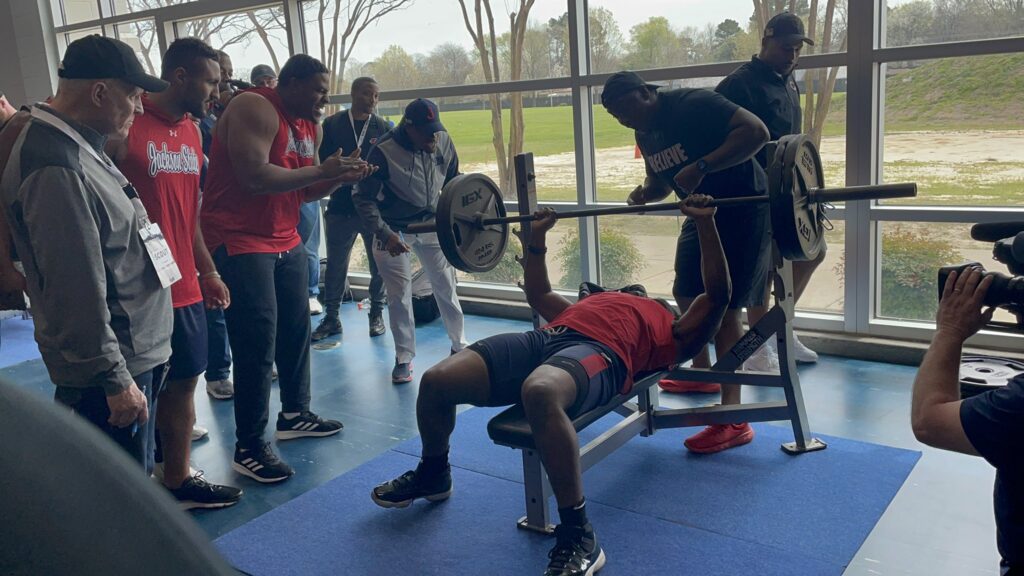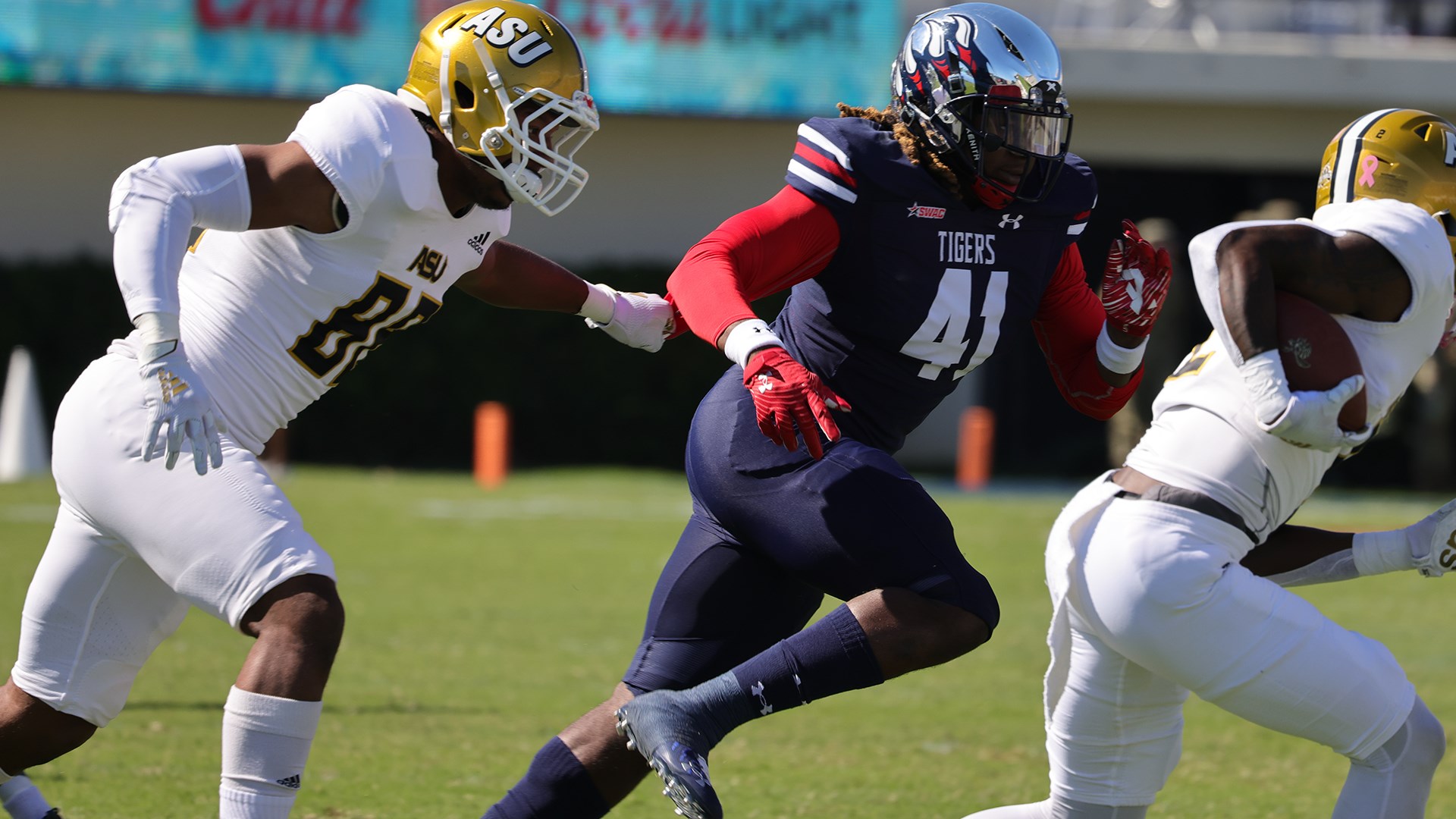Sitting inside a room within the confines of the Jackson State football facility, Deion Sanders proceeded to rattle off each of the NFL teams that failed to send a scout to the school’s pro day.
“The Dolphins, the Broncos, the Texans, the Bills, the Buccaneers, the Ravens, the Panthers, the Browns, the Vikings, and the Eagles, where art thou?” Sanders asked in a video posted to his personal Instagram account. “You could have sent somebody man. You could have shown up just a little bit.”
Scouts representing 22 teams reportedly were in attendance on Monday, almost an unheard number for an FCS program let alone an HBCU that did not feature a sure-first first-round draft pick.
But Sanders, who days earlier promoted that 32 teams would be in attendance at the event, was staunchly disappointed that one-third of the league’s talent evaluators were not there to see the likes of James Houston and CJ Holmes.
“But I guarantee you that you’re going to go to Mississippi State and Ole Miss. I guarantee you that you’re going to show up there. I understand. I understand you’re saying they have more talent. I understand.
“Guess what — we coming. And when we arrive, you better be here. Because our kids deserve it,” he said. “You could have sent a scout. You could have sent somebody, that’s all I’m saying. We won’t forget.”
While Sanders’ disenchantment could be understood for a coach who’s said and done everything within his power to influence HBCU football players being placed on NFL radars, pro days are only a very small piece to what is an exhaustive information collection process.
Also read: Deion Sanders says ‘no way’ HBCU players will not get taken in ’22 NFL Draft
What is known is that all 32 teams don’t show up at every pro day — whether it be hosted by a small school — or the blueblood elite of the FBS level. There are several factors that go into why pro day head-counts are not uniform.
It all starts with communication between schools and the league, explained Dane Vandernat, current NFLPA Collegiate Bowl personnel director and former Oakland Raiders pro personnel director.
All NFL teams belong to a scouting hub called Association of Professional Teams that involves clubs collaborating to ensure schools that have legitimate draft-eligible prospects are covered by whatever team wants to attend a pro day. The group also attempts to make sure that at least one team scout is represented at an event who accounts for all prospect information to be then shared among league members.
So all the measurable data for instance, from Jackson State’s pro day, are going to be sent to all 32 teams for evaluation.

“During my time experience with the Oakland Raiders, what we would do is all the players that we had evaluated as a free agent or draftable, we wanted to make sure that we at least got see those players into the (NFL) Combine or through schools pro days,” said Vandernat. “(For) some schools, we may not send a representative in person if we did not have a free agent or draft grade. But for those that we did, we wanted to ensure we had boots on the ground to see him physically.”
Ultimately, it’s up to the individual clubs’ discretion whether they send representatives or not.
Beyond team approach or value system, scouting — in general — is a fast-paced grind, particularly in March, just a month away from the draft when clubs are making their final evaluations. Regional scouts routinely cover several thousand miles traveling from campus to campus to watch and talk to prospects and coaches.
That reality often comes with deciding which campuses to visit and when. Though there is no secret when pro days are being held, that doesn’t always mean scouts can get to each site if there is a scheduling or time constraint.
Scheduling, timing is important
Brad Kaplan was an NFL scout for 12 years. He says that those who function in his profession can work with schools to help them coordinate pro days to maximize opportunities for players to be evaluated.
“Colleges basically have ownership of scheduling that pro day whenever they want,” Kaplan told HBCU Sports in a phone interview on Wednesday. “If there is a scout or two that works with the school to help them coordinate it, you try to make it (the pro day schedule) so each scout can see every school.”
Each scout in a certain regional area is responsible for finding out when all of the pro days are. Schools that host them notify the NFL once a date is set. Typically there will be a pro liaison on the coaching staff or in the athletics department who is in charge of setting up the event and filing it with the NFL.
What needs to be avoided, said Kaplan, is a situation where there are several conflicting pro days in one region on the same day.
On Monday, Jackson State shared the same pro day date as Iowa, Nevada, Northern Iowa, Pittsburgh and Toledo, according to the NFL.com schedule tracker. There were pro days held at Iowa State; Liberty; Mississippi State; Nebraska; Rutgers; San Diego State; Texas A&M and Virginia Tech on Tuesday.
Only Mississippi State, a school that Sanders suggested would have more scouts in attendance at its pro day in nearby Starkville, was in Jackson State’s region. All 32 teams were represented there, likely to see projected top-10 draft pick Charles Cross, a highly-touted offensive lineman.
Just down the road in Oxford, 71 scouts and NFL personnel from 31 teams came to see Ole Miss quarterback Matt Corral throw on Wednesday. Only the Super Bowl champion Los Angeles Rams didn’t have a representative there.
However, it doesn’t necessarily mean teams that didn’t send scouts to Jackson State but did to Mississippi State or Ole Miss undervalued those who worked out in Jackson.
‘We have all the footage that we need’
Some NFL teams are inclined to send scouts to schools that feature first-round talents. Others will prioritize looking at prospects who would fall into the priority free-agent category, said Kaplan.
“A lot of times you kind of have a say what schedule you want to do,” he said. “You can’t get to every pro day that you want to, it’s just not feasibly possible. And so then you need to ask for support from the office or other scouts if they can come cover for you.”
Another reason that every available scout might not be at a site is simply that teams already have tape and other pertinent details on most draft-eligible players complied through in-season scouting, college all-star games, and various pre-draft combines.
“We didn’t send scouts to every school in the country,” said 13-year NFL veteran turned pro scout Von Hutchins. “It wasn’t from the standpoint of disrespect to the schools. It wasn’t from the standpoint of disrespect of the players.
“We have all the footage that we need, that’s No. 1.”
For many scouts, a pro day is used to verify whether the metrics and film assembled over a period of months match with in-person activity. A prospect’s draft status will more often than not be significantly impacted unless there is a divergence in performance.
“I would say 95% of March is a waste of time because you should know all that information,” said Kaplan. “So you’ve got all the heights and weights, and all those numbers get sent to (the NFL). There’s very little that is necessary.”
Despite the notable absences from scouts at Jackson State’s pro day or any other, doesn’t automatically equate to teams not drafting those players come April, either.
But could Sanders publicly criticizing specific NFL teams compromise potential working relationships among scouting networks within the league?
Vandernat, Kaplan, and Hutchins all discounted that notion. The majority of clubs, they say, are going to do their due diligence on draftees because the process — and what’s at stake — warrants the work. NFL teams will always go to where the players are, and so if there’s talent around, they’re going to make sure that talent is seen.
Sanders starting this conversation in the first place speaks to a different kind of motivation for the third-year head coach beyond placing certain NFL outfits on notice.
“You have to understand that Deion is recruiting,” said Hutchins. “That’s what the conversation was really about. Deion is recruiting the fact that 22 teams showed up to an HBCU pro day. That speaks volumes to what Deion has created and what HBCUs have gained throughout this process.”







